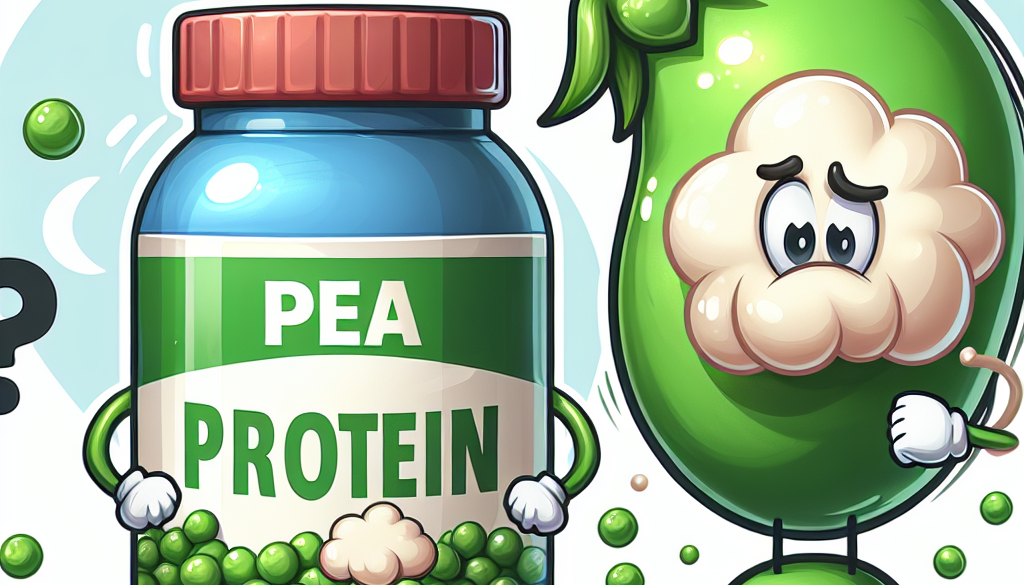Does Pea Protein Cause Gas And Bloating? Deep dive
Table of Contents
- Pea Protein and Digestive Health: Does It Cause Gas and Bloating?
- Understanding Pea Protein
- Pea Protein and Digestive Discomfort
- Fiber Content and Digestion
- Complex Carbohydrates
- Individual Sensitivities
- Minimizing Gas and Bloating from Pea Protein
- Gradual Introduction
- Hydration
- Combining with Other Foods
- Probiotics
- Case Studies and Research
- Conclusion: Balancing Benefits and Digestive Health
- Discover ETprotein’s High-Quality Pea Protein Products
Pea Protein and Digestive Health: Does It Cause Gas and Bloating?

Pea protein has become a popular plant-based alternative to animal-derived proteins, especially among vegetarians, vegans, and those with dietary restrictions. As the demand for sustainable and allergen-free protein sources grows, pea protein is often celebrated for its high protein content and amino acid profile. However, some individuals report experiencing gas and bloating after consuming pea protein. This article delves into the potential digestive issues associated with pea protein and provides insights into how to mitigate these effects.
Understanding Pea Protein
Pea protein is derived from yellow split peas and is a high-quality protein that contains all nine essential amino acids. It is commonly used in protein powders, meat substitutes, and a variety of health food products. Pea protein is favored for its low allergenic potential, as it is naturally gluten-free and lactose-free, making it a suitable option for many with dietary restrictions.
Pea Protein and Digestive Discomfort
Despite its benefits, some individuals report digestive discomfort, such as gas and bloating, after consuming pea protein. This section explores the reasons behind these symptoms and how pea protein may affect gut health.
Fiber Content and Digestion
Pea protein contains dietary fiber, which is essential for healthy digestion. However, a sudden increase in fiber intake can lead to gas and bloating, especially for those not accustomed to high-fiber diets. The body may need time to adjust to the increased fiber levels found in pea protein products.
Complex Carbohydrates
Peas contain complex carbohydrates called oligosaccharides, which can be difficult for some people to digest. These carbohydrates can ferment in the gut, producing gas and causing bloating. While pea protein is often processed to remove most carbohydrates, trace amounts may still be present and contribute to digestive issues.
Individual Sensitivities
Individual sensitivities to pea protein can vary. Some people may have a harder time digesting pea protein due to unique gut flora compositions or underlying digestive conditions. It’s important to consider personal sensitivities when incorporating pea protein into the diet.
Minimizing Gas and Bloating from Pea Protein
For those experiencing gas and bloating from pea protein, there are several strategies that can help minimize these symptoms.
Gradual Introduction
Introduce pea protein into your diet gradually. Start with small amounts and slowly increase the serving size over time to allow your digestive system to adapt.
Hydration
Drinking plenty of water can help facilitate digestion and reduce the likelihood of gas and bloating. Adequate hydration helps fiber move through the digestive system more efficiently.
Combining with Other Foods
Consuming pea protein with other foods, especially those that aid digestion, can help mitigate digestive discomfort. Foods rich in digestive enzymes, such as pineapple and papaya, may be beneficial.
Probiotics
Incorporating probiotics into your diet can improve gut health and may help reduce symptoms of gas and bloating. Probiotics introduce beneficial bacteria to the gut, which can aid in the digestion of pea protein.
Case Studies and Research
Several studies have investigated the effects of pea protein on digestion. While research is ongoing, some findings suggest that pea protein may be well-tolerated by many individuals, with only a minority experiencing significant digestive issues.
- A study published in the Journal of Nutrition found that pea protein was as effective as whey protein in promoting muscle thickness gains, with no significant differences in reported gastrointestinal symptoms.
- Another study in the International Journal of Food Sciences and Nutrition indicated that pea protein did not cause more gastrointestinal distress than other protein sources when consumed in moderate amounts.
However, more research is needed to fully understand the digestive implications of pea protein consumption, especially in sensitive individuals.
Conclusion: Balancing Benefits and Digestive Health
While pea protein is a nutritious and sustainable protein source, it may cause gas and bloating in some individuals. Understanding the potential digestive issues and implementing strategies to minimize discomfort can help individuals enjoy the benefits of pea protein without undue digestive distress. By gradually introducing pea protein, staying hydrated, combining it with other foods, and possibly incorporating probiotics, many can mitigate the risk of gas and bloating.
Discover ETprotein’s High-Quality Pea Protein Products
If you’re looking for a reliable source of pea protein, consider ETprotein’s offerings. Their pea protein products are designed with digestibility in mind, providing a neutral taste and non-GMO, allergen-free attributes. With a commitment to quality and customer satisfaction, ETprotein caters to a wide range of industries, ensuring that you receive the best plant-based proteins for your health and wellness needs.
About ETprotein:
ETprotein, a reputable protein and L-(+)-Ergothioneine (EGT) Chinese factory manufacturer and supplier, is renowned for producing, stocking, exporting, and delivering the highest quality organic bulk vegan proteins and L-(+)-Ergothioneine. They include Organic rice protein, clear rice protein, pea protein, clear pea protein, watermelon seed protein, pumpkin seed protein, sunflower seed protein, mung bean protein, peanut protein, and L-(+)-Ergothioneine EGT Pharmaceutical grade, L-(+)-Ergothioneine EGT food grade, L-(+)-Ergothioneine EGT cosmetic grade, L-(+)-Ergothioneine EGT reference grade and L-(+)-Ergothioneine EGT standard. Their offerings, characterized by a neutral taste, non-GMO, allergen-free attributes, with L-(+)-Ergothioneine purity over 98%, 99%, cater to a diverse range of industries. They serve nutraceutical, pharmaceutical, cosmeceutical, veterinary, as well as food and beverage finished product distributors, traders, and manufacturers across Europe, USA, Canada, Australia, Thailand, Japan, Korea, Brazil, and Chile, among others.
ETprotein specialization includes exporting and delivering tailor-made protein powder and finished nutritional supplements. Their extensive product range covers sectors like Food and Beverage, Sports Nutrition, Weight Management, Dietary Supplements, Health and Wellness Products, and Infant Formula, ensuring comprehensive solutions to meet all your protein needs.
As a trusted company by leading global food and beverage brands and Fortune 500 companies, ETprotein reinforces China’s reputation in the global arena. For more information or to sample their products, please contact them and email sales(at)ETprotein.com today.












